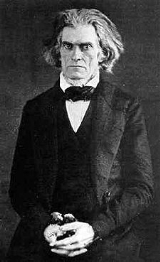
during the first half of the 19th century. Calhoun eloquently spoke out on every issue of his day, but often changed positions. Calhoun began his political career as a nationalist, modernizer, and proponent of a strong national government and protective tariffs
. After 1840 he switched to states' rights
, limited government
, nullification
and free trade
. He is best known for his intense and original defense of slavery as something positive, for his inventing the theory of minority rights in a democracy, and for pointing the South toward secession from the Union
.
Devoted to the principle of liberty (though not for slaves) and fearful of corruption, Calhoun built his reputation as a political theorist by his redefinition of republicanism
to include approval of slavery and minority rights—with the white South the minority in question.
Protection and patriotism are reciprocal.![]()
The very essence of a free government consists in considering offices as public trusts, bestowed for the good of the country, and not for the benefit of an individual or a party.![]()
A power has risen up in the government greater than the people themselves, consisting of many and various and powerful interests, combined into one mass, and held together by the cohesive power of the vast surplus in the banks.![]()
The surrender of life is nothing to sinking down into acknowledgment of inferiority.![]()
It is harder to preserve than to obtain liberty.![]()

